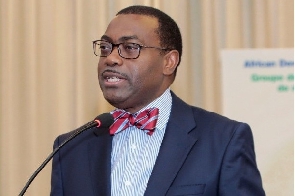 Dr. Akinwumi Adesina, President of the African Development Bank
Dr. Akinwumi Adesina, President of the African Development Bank
African Development Bank (AfDB) Group President Dr Akinwumi Adesina says collective action involving governments, households, international donors and the private sector will be required in addressing Africa’s education and skill gaps.
Fostering a more inclusive growth would also require building Africa’s human capital and creating more jobs in high-productivity sectors.
Commenting on the 2020 African Economic outlook titled, “Developing Africa’s Workforce for the future,” Dr Adesina said to build human capital and create additional jobs, countries should seek to integrate education and skill development strategies into their economic development plans.
They should also, at the same time, be upgrading and expanding their education and training programmes to strengthen worker employability and firm productivity.
He said the move required measures to improve both the quantity and the quality of education, which also call for expanding access to schools in remote areas, increasing incentives to invest in education, developing a demand-driven education system.
These measures, Dr Adesina said, should be in synch with employers’ needs and investing in nutrition to help poorer children, and building Science, Technology, Engineering and Mathematics as well as Information and Communication Technology capacity.
The 2020 African Economic outlook appeals for progressive Universalism in education spending - setting high priorities for the poor and disadvantaged and for basic education, where social returns are highest as a way of addressing inequality in education.
It shows that public expenditures on education and infrastructure are highly complementary, as investing in both has a much greater payoff than investing exclusively in just one.
It adds that the efficiency of education spending is much lower in Africa than in developing and emerging Asia.
But, the AfDB President said, the good news was that by enhancing the efficiency of education spending - now at 58 per cent for primary schooling - African countries could almost reach universal primary enrollment without increasing spending at all.
The outlook commended key policies to improve spending efficiency and education quality to include; conducting education expenditure audits and reviews, improving teacher quality, and using performance-based financing.
This year’s Outlook offers numerous ways for African countries to develop the workforce of the future.